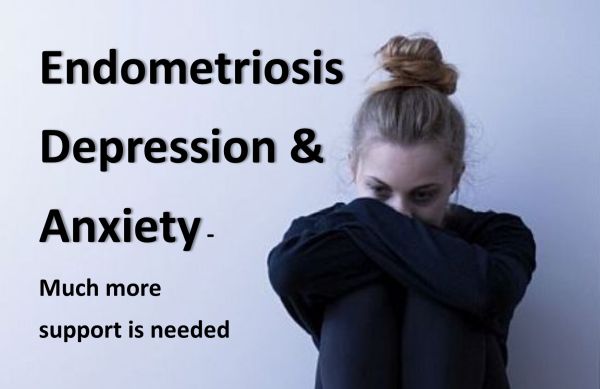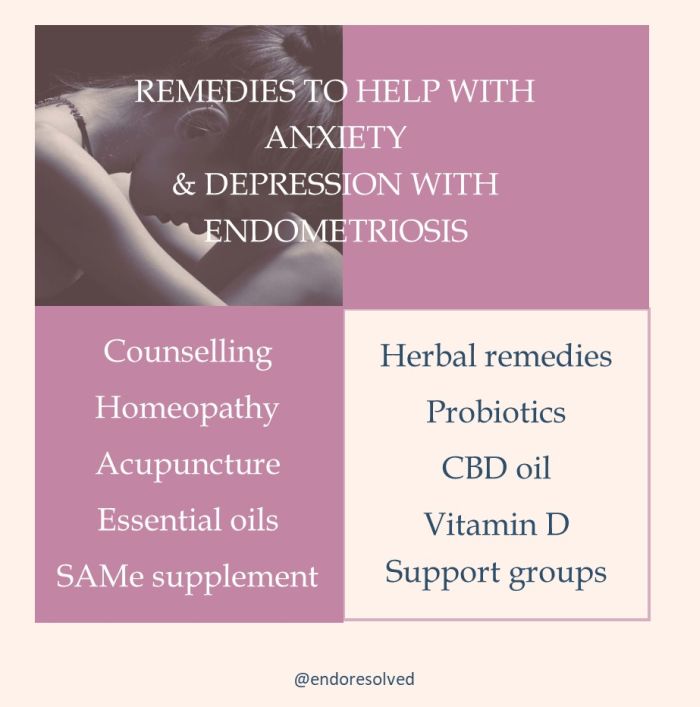Dealing with depression & anxiety with endometriosis

Endometriosis has far reaching affects in a woman’s life and this includes how it affects her mentally. This can manifest as depression and anxiety and will cause a great amount of distress. But the emotional effects of this disease are not openly discussed very often, either by those who suffer the disease or by the medical profession.
Suffering from depression is seen as a weakness in modern society and many people keep their depression quiet, mostly because opening up about depression can drive people away – just when you need them most. So, people who suffer emotional distress often have to suffer in silence.
There needs to be much more discussion around the topic of mental health in relation to serious illnesses like endometriosis. Additionally, this disease can leave many feeling isolated which can make the problem of suffering from stress and anxiety even worse.
As Nancy Petersen, endometriosis advocate and RN, has said: “Endometriosis is not fatal, but despair can be.”
Good reason for depression
Because the disease of endometriosis affects so many areas in a woman’s life, it will cause stress and worry and depression on many levels.
There is the constant stress on a daily basis of dealing with the symptoms of pain, inflammation, abdominal distress, fatigue and generally feeling really unwell. Going through this day in, day out is enough to cause severe depression.
Add to the daily grind of symptoms is the worry about jobs, finances, medical costs and future financial insecurity. The financial impact can be huge for many sufferers with the constant worry about the ability to be able to keep working. Medical bills can very quickly add up especially when living in a country with no free medical care or the treatment is not covered by insurance.
Then there is the issue of how endometriosis affects a woman’s relationships. Many of their friends start to disappear one by one. Having endometriosis often means having to cancel arrangements and social engagements till eventually they are no longer included in social invites. Women are then left feeling more and more isolated and abandoned. Even family members can be insensitive, not believing how bad the symptoms of this disease can be.
There is the huge stress that can be placed on close personal relationships, which can be seriously affected because of problems concerning painful sex and intimate relations. This can often lead to the breakdown of relationships and can (and does) end marriages.
One major fear is the possibility of infertility which weighs in heavily and can cause severe anxiety and stress. This too can lead to tensions in a relationship when hoping to have a family. Being witness to friends going in and out of the maternity unit really does ‘rub salt into the wound’. Even watching television adverts about baby products with gurgling happy babies can cause distress and increase depression.
All these factors added up can really put severe strain on emotions and will only get worse without some sort of support being provided.
My own understanding of how distressing, isolating and
frightening the experience of living with endometriosis can be is one of the
reasons this website is here. Not only
to provide regular advice and information about the disease, but to also
provide support and hope.
This is hopefully achieved by providing positive advice, encouraging feedback stories from others, as well as advice about the measures that women can take to help reduce the impact this disease has on their life.
What are the measures you can take to help with the emotional aspect of endometriosis?
Counselling
The obvious first port of call to get help is to consider counselling. You need a sympathetic trained counsellor. Counselling is not about giving advice or solving your problems. A good councillor will help you to explore your feeling and emotions and allow you to talk openly and freely.
This is something that is often not possible to do with family or friends because there is emotional involvement, or their opinions are in conflict with the issues you are trying to deal with. Being able to talk to a counsellor gives you the opportunity to express your anger, fear, guilt and distress without being judged. A counsellor will not tell you what to do, or what actions to take, but they will help you navigate and work through your emotions so that you are better equipped to manage them.
Natural therapies
There are certain natural therapies that can provide support to help manage the emotional aspects of dealing with the stress of illness. Homeopathy is a very good choice and has a huge arsenal of different remedies that can be used for very specific emotional imbalances. A homeopath will take a very detailed description of symptoms, both physical end mental.
Remedies will then be prescribed to help shift these imbalances. Some of these remedies are very strong and only a single dose may be prescribed, with a follow up visit maybe many weeks later where progress is assessed and maybe another remedy being prescribed.
Other remedies that may help include acupuncture, which can release emotional blocks and help balance the body. Aromatherapy is very powerful and many essential oils can help with different emotions.
Supplements for anxiety
SAMe
One really good supplement to help with depression is SAMe (S-adenosylmethionine). SAMe is the synthetic form of a compound that is produced naturally in the body from methionine (an essential amino acid) and adenosine triphosphate (an energy-producing compound). SAMe is a precursor of several amino acids including taurine, glutathione, and cysteine. SAMe is used to help with depression, fibromyalgia, anxiety and pain – all of which makes this a good supplement for those with endometriosis. Additionally, SAMe is reported to support liver health by helping to increase glutathione.
St. John’s wort
Another supplement known to help depression and anxiety is St John’s Wort, known to be as effective as antidepressants but without the side effects. It’s important to note that St. John’s wort is known for interacting with lots of medications. This is especially true for blood thinners, birth control pills, and chemotherapy medications.
Valerian root
This herb is often used in herbal sleeping tablets for its calming and sedative properties, but Valerian also can calm anxiety. Valerian can be used in the day in small doses to calm the nerves or used as a tea.
Chamomile
This is another remedy used to help with sleep and anxiety. Recently, a study was conducted comparing chamomile extract with placebo for treatment of generalised anxiety disorder. After 8 weeks of this study, results showed that people with anxiety had a significant reduction in their anxiety.
Ashwagandha
Ashwagandha has been used for numerous conditions, many of which have been studied scientifically. This herb can help reduce stress hormones and reduce anxiety. A treatment group in a randomised, double blind study of Ashwagandha compared to placebo demonstrated that the blood cortisol levels after 60 days showed a marked decrease, and the side effects were minimal.
Thyme
Thyme is a great source of lithium and tryptophan. Both can help as mood stabilizers and aid sleep. Thyme can be found as an herbal tea or used externally with the essential oil massaged into the body mixed with a carrier oil.
Probiotics
Interestingly certain probiotics can affect mood – it is now commonly known that the gut is the second brain. Supplementing with Bifidobacterium and Lactobacillus strains for 1–2 months can improve anxiety, depression and memory.
Support from others
Finding others in the same situation as yourself can be very empowering and provide great relief to know that you are not alone in this struggle. Joining some of the online forums, message boards, Facebook groups or other social media resources can give you a life-line to provide you with support, share experiences and learn tips that have helped others.
To help manage the depression and anxiety of this disease there are a number of measures you can use to help. The main thing is to NOT stay in isolation as this will only make matters worse. Ensure you have a support network and try some of the tools mentioned here to help you manage the emotional roller-coaster of endometriosis.

About the Author
Hi, I am Carolyn Levett, the Founder here at endo-resolved - I am an Integrative Health Coach having studied nutrition, naturopathy and aromatherapy as well as being a published author of three endometriosis books. I used to suffer from severe endometriosis and was fortunate to be able to regained my health and recover from this disease with the support of nutrition, natural therapies and lots of determination.
My motivation is to help other women with endometriosis to heal their bodies so they may start to overcome this awful disease without having to totally rely on toxic drugs and surgeries which can cause further damage - with healing thoughts, Carolyn.
Reference:
https://www.ncbi.nlm.nih.gov/pubmed/19593179
https://www.ncbi.nlm.nih.gov/pmc/articles/PMC3573577/
 As featured in:
As featured in:





